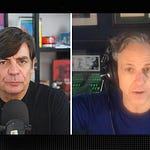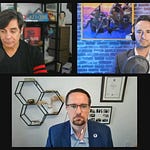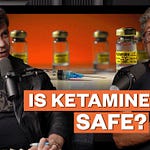Over the past 30-plus years, my Reason colleague Jacob Sullum has been a tireless advocate for two things that aren’t normally paired together: total drug legalization and massively expanded gun rights. Apart from a few oddballs—such as the great satirist, novelist, and social critic Robert Anton Wilson, who founded the Guns & Dope Party—it turns out that most drug legalizers want to restrict gun possession and many gun rights activists are hostile to ending the drug war.
In his new book, Beyond Control, Jacob explores the tangled racial roots of gun control and drug control. The first restrictions on gun ownership in America (both as British colonies and as the United States) were aimed at African Americans, especially those living in the South. Weirdly, enslaved blacks sometimes had more gun rights than freed blacks because the former were at least under the control of a white master while the latter could only be troublemakers. One of the results of such a horrible state of affairs was a long tradition of ‘armed black self-defense’ that counted among its champions Frederick Douglass, the sadly underappreciated T.R.M. Howard, the Black Panthers, and the Deacons for Defense and Justice (who provided armed protection to marches that Martin Luther King, Jr. participated in). Toward the end of the 19th century, especially as European immigrants flooded the East Coast, gun laws targeting southern Italians and other crime-prone undesirables with an obvious inability to manage their oversized emotions proliferated. In the early 20th century, Prohibition created black markets in booze, which predictably increased all sorts of violence, which led to more restrictions on guns too. This is government as Munchausen Syndrome by Proxy—the authorities create or intensify problems and then present themselves as the solution.
Many of the first restrictions on drugs also explicitly targeted racial and ethnic minorities (back in the day, pols didn’t bother to cloak their objectives behind euphemisms). Jacob’s chapters on the awful treatment of Chinese residents in San Francisco are extremely memorable and deeply disturbing. Despite the fact that opium-infused tinctures and patent medicines were widely available, opium smoking, which was popular among Chinese, was targeted as particularly immoral and dangerous. The same went for ‘marihuana’ and cocaine—they too showed up in all sorts of drinks and medicines that were available at every pharmacy and through the mail. But they became associated with Mexicans and blacks and had to be suppressed. Curiously, the pioneers of national bans on drugs and guns recognized that they really had constitutional powers to control such things, and thus became inventive to pass laws that should exist only at the state level.
In Beyond Control, Jacob is careful to note that gun and drug restrictions were fueled and sustained by more than old-school racism. Indeed, he notes members of the Congressional Black Caucus (most notably, New York Rep. Charles Rangel) pushed for harsher penalties for crack versus powder cocaine, as well as stiffer penalties for guns that were associated with urban crime.
We also talk about the progress that’s been made over the past 25 or 30 years, both in terms of gun rights and drug legalization. Part of this is because major champions of gun and drug controls have realized their solutions didn’t work (Rangel certainly did, and became a leader for reform). Interestingly, Joe Biden started his career as a staunch anti-drug crusader but a mild supporter of the Second Amendment. Over time, though, he rethought his drug prohibition stances while becoming more and more hostile to gun ownership despite declines in gun-related crime and violence since the 1990s (the one big exception is gun-related suicides). As a convicted felon, Donald Trump is legally barred from owning guns, even as the nuclear codes are in his care. Like Biden, Trump has indicated a willingness to at least reschedule marijuana at the federal level but has not done so yet.
We begin our conversation with a discussion of the recent mass shooting at a church in Minneapolis that killed two and injured over 20 others. The shooter, who killed themselves, identified as trans, leading the Trump administration to reportedly explore banning all trans people from owning guns. Such an action, Jacob notes, is straight out of a very old playbook, is blatantly unconstitutional, and will do nothing to reduce gun crime. For what it’s worth, Attorney General Pam Bondi’s public musings are already splitting the MAGA coalition, which seems to be generally hostile to trans people but fiercely protective of gun rights. We also discuss ways to minimize the number and severity of mass shootings and whether red flag laws (which temporarily abrogate an individual’s Second Amendment rights) and assault-weapon-style bans work as intended.
You can watch or listen above. Here’s a link to the YouTube version if you prefer to watch there:
If you like what I’m posting here, please subscribe, share, and comment. And check out Reason.








